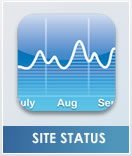|
The fact of the matter is that if your
competition is both well optimised AND has a stronger number of Good
Quality Inbound Links from quality, relevant websites using strong
anchor text then you will be out ranked. Link popularity is now THE
dominant factor in who ranks the highest within Google. Other major
search engines such as Yahoo and MSN also give a strong emphasis to
back links for their ranking criteria.
In a fiercely competitive environment, link popularity will make or
break your search engine optimisation campaign. Links more often
than not are heavily content related. To earn them a site must offer
high quality content and be considered worthy as a destination to
visitors.
It's an irrevocable fact of web life that search engines live for
relevance - relevance is why sites are elevated to high search
return positions. Off Page Search Engine Optimisation in the form of
link building if applied professionally to a professionally
developed site will work to highlight the relevance of the site.
Development of high quality copy and content is an ongoing related
process in conjunction with developing inbound links.
The name of the game is to win friends who in turn influence your
search engine ranking. Google themselves say - In general,
webmasters can improve the rank of their sites by increasing the
number of high-quality sites that link to their pages. Sites with
genuine authority will only link with sites they feel to have
genuine authority (after all their reputation is at stake to a
degree by association to you) and this will boil down to content and
relevance making it easy for the search engines to identify you.
A high search engine ranking leads to more friends and so the
virtuous circle continues. Let SEO-MAMA make sure that this vital
aspect of your SEO pushes you to the front of the field. Remember -
authority isn't established through what's on your web pages alone.
It is earned from a combination of various factors and in particular
inbound links and how many websites with Authority you are
affiliated with.
There are numerous ways in which we can integrate link building into
our suite of SEO tools. Largely an off page component of an SEO
campaign it merges into online PR and wider web profiling
activities. Link building is as essential as it is varied.
Here's a short list of possible link opportunities that we explore
as the link building aspect of a SEO campaign:
Profile Sites - New style "Web 2.0" sites often allow for the
creation of profiles with links, from Frappr and Newsvine to MySpace
and Yahoo! 360 to Digg, Del.icio.us and StumbleUpon are potential
goldmines for links.
Blogsphere - Identify the leading movers and bloggers in your
market place. Link to them from your blog but let them know you've
done so. If your site has quality it's probable that many will
reciprocate.
University sites - .edu or .ac sites carry great weight.
Maybe you could write an article or contribute in some other way
that could deserve a link.
Government sites - again .gov sites carry great weight.
Your own blog - Interesting, specific information is often of
interest to potential visitors. A blog can be a very useful starting
point from which to generate interest in your site.
Professional contacts - friends' sites, suppliers or industry
bodies. It's always good to network your URL.
Directories - Yahoo, yell.com, DMOZ etc there are numerous
paid for and free directory submission opportunities. This is the
easiest and fastest method of link building. There are numerous good
quality (human-edited) directories whose permanent directory
listings show up as valid back links within Google, Yahoo and/or
MSN. We manually submit to quality directories that have relevant
sub-categories.
Link baiting - embed copy or media with links contained within the
site content. We apply smart, 'sticky' Internet marketing to
entertain and attract attention.
High quality exclusive content - Content is king. High
quality, exclusive content reigns supreme. Offering high quality
content, useful tools, or other helpful services can be a powerful
way to attract non-reciprocal links. Imagine the authority of a site
that establishes itself as an industry resource - tefl.com or
alibaba.com for example
Article submission, syndication and article exchange -
Articles like this one are an extremely useful way of link building
and generating inbound links. Articles are likely to be relevant,
non reciprocal (it is widely believed these days that non-reciprocal
links are weighted more heavily than reciprocal links) and you may
have the opportunity to include links to more than just one page in
the article. This might include a reference to an internal page
within the piece and maybe the home page URL as part of the author's
biog.
Widgets - screen savers and wallpapers, feed displays, viral
applications, niche applications that site owners can include on
their own sites are a great way to build links.
Contests - links that could win a prize
Offline marketing - use offline marketing campaigns to
generate links
Link requests - Identify sites/pages that you want to be
linked from. If you don't ask (politely) you don't get.
Again relevance is key and it's always important to ask yourself,
"Is mine a site that my visitors would be interested in?" It's a
pointless exercise for everybody otherwise. If you can honestly
answer that your site visitors would be genuinely interested in a
site then the link is good.
In addition to link building concepts listed above there are also a
number of technical SEO adjustments that can be applied to help
increase the potency of the SEO and link building campaign. Site
structure, site size, cohesion of the content across the site, the
internal linking structure and Keyword Density all play an role to
some degree or other.
On page interlinked content (the internal anchor text, its source
and destination) can prove a powerful factor in generating search
engine authority and subsequent high returns. When the opportunity
presents itself links to related products, related articles and
related searches should be included. Anchor Text is optimised and
keywords deployed throughout documents that are applied to an
internal linking strategy based on contextual architecture.
Each web page should be approached as a standalone entity with a
unique title tag that reflects the content on that particular page.
Including keywords in your domain/sub domain or file/folder is
always advisable and strong Search Engine Optimisation will ensure
that your page/folder URL contains your most important keyword.
Ideally name your web page files starting with the targeted keyword
- keyword.htm - It doesn't matter how awkward web page files look or
sound, as they are not publicly viewable. It's only you and the
search engine spiders get have access to them.
Link building is an ongoing process and to ensure a solid and secure
influence on the search engines a number of approaches to gaining
them should be adopted simultaneously.
|



















